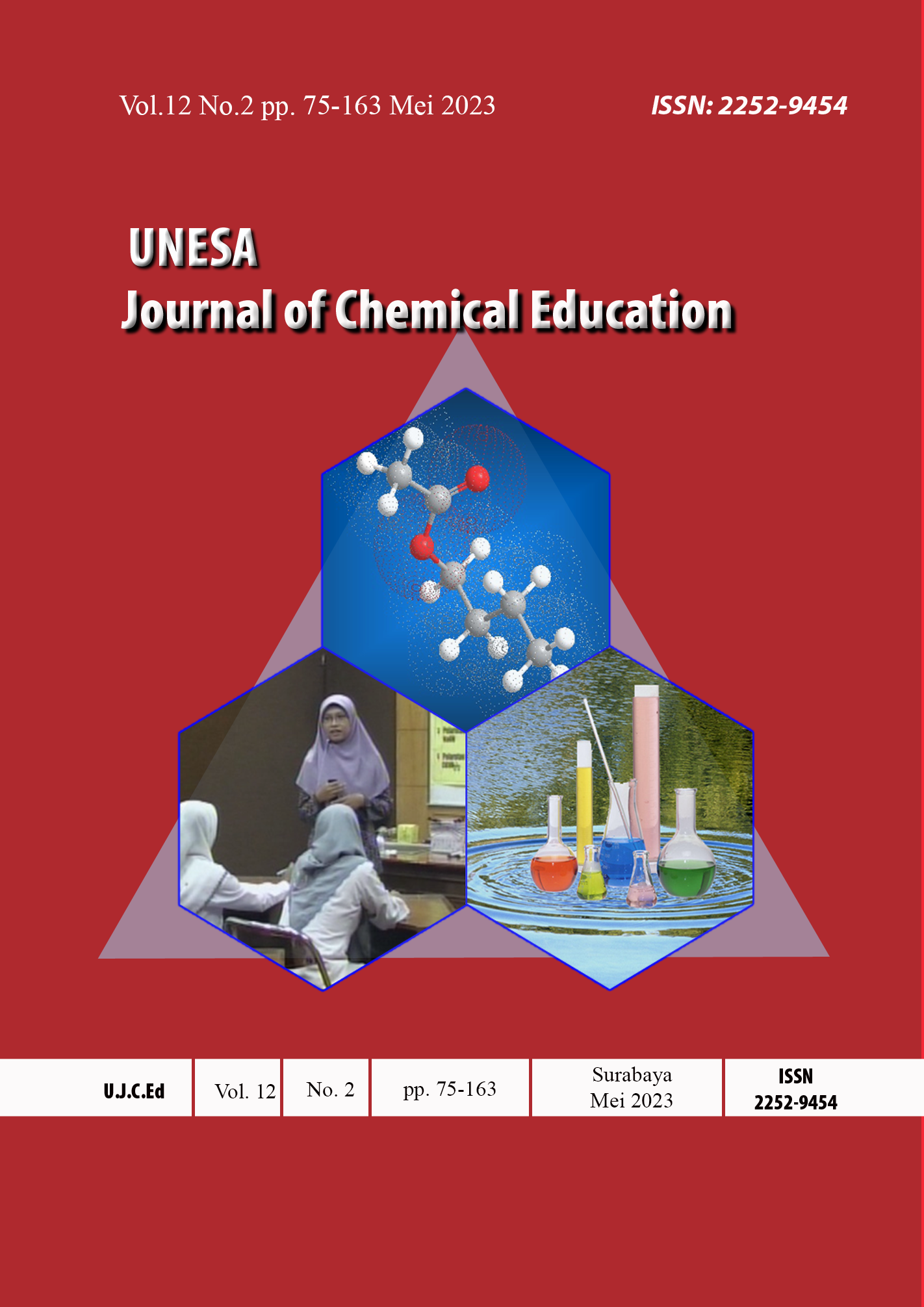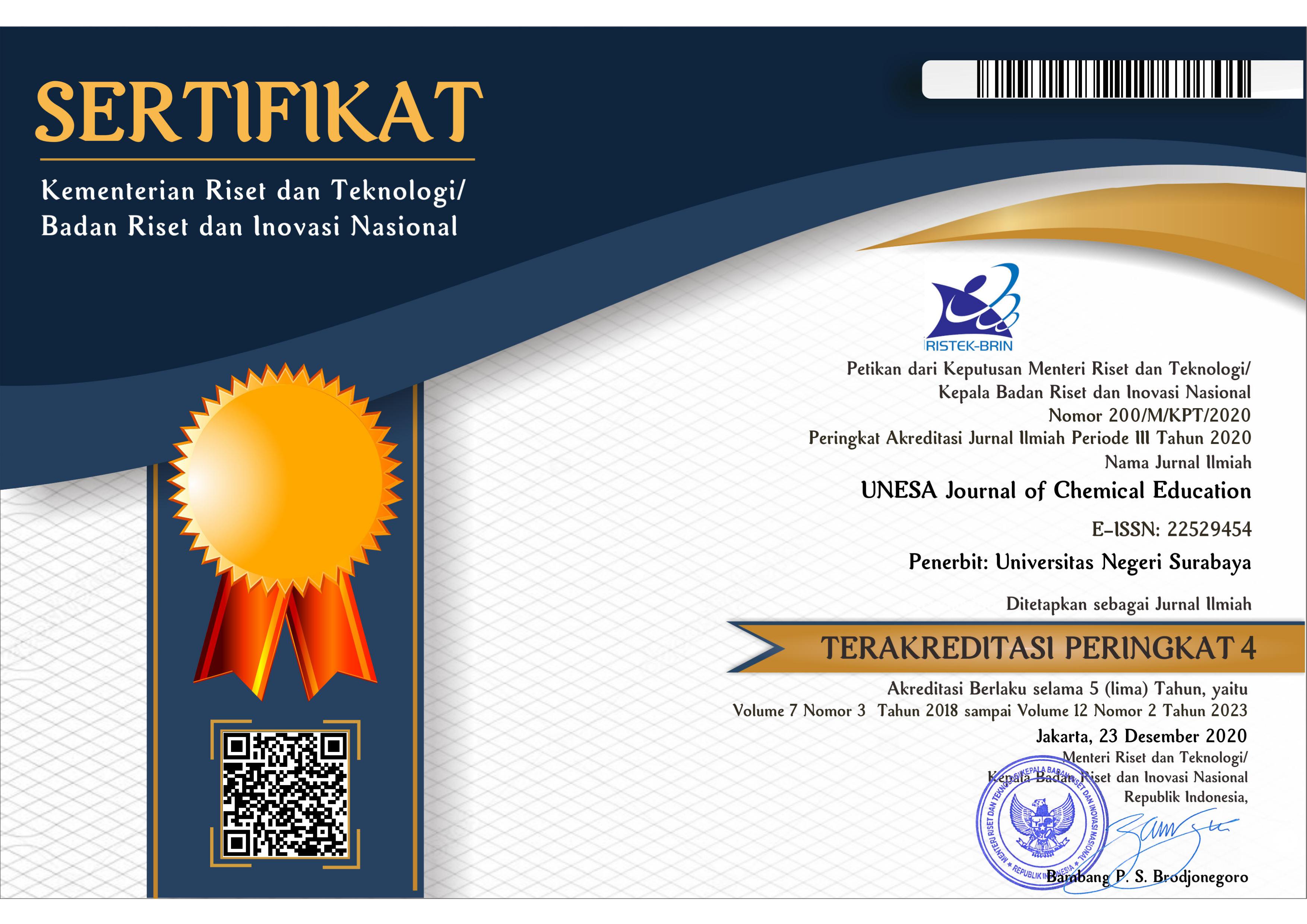INCLUSIVE SKILL DEVELOPMENT FOR CHEMISTRY EDUCATION PROGRAMME
Abstract
This article aims to inform the reviewers of Chemistry Education curriculum on the need for inclusive skills in chemistry education programme. Chemistry Education itself is a pseudo-scientific research field, studying the process of teaching and learning of chemistry through the procedural connections among research, theories and practices. Recently, the introduction of Inclusive Education Policy (IEP), into the entire education system where special need students with physical, hearing and visual impaired must be accommodated to learn with conventional students, requires that pre-service teachers be empowered with coping skills. It has also become a reality that many chemistry education graduates are working in various organizations other than schools including; banks, social media, advertisement industries, etc. This reality requires that students be guided towards diverse career prospects. They need training not only in the technical skills required by the teaching profession but also soft skills such as emotional intelligence, digital literacy, and interpersonal skills among others. These skills are not only imperative to becoming professional teachers but also transformative leaders in their future organizations. Consequently, this study describes the benefits of inclusive skills and suggested their inclusion into the curriculum to accommodate special need students, and increase post-graduation employability ratio.
References
Nigerian University Commission, 2023. CCMAS. Abuja; Ministry of Education.
Andrews, J., Higson, H. 2008. Graduate employability, ‘Soft Skills’ Versus ‘Hard’ Business Knowledge: A European Study. High. Educ. Eur., Vol 33, pp. 411–422.
Galloway, K. W. 2017. Undergraduate Perceptions of Value: Degree Skills and Career Skills. Chemistry Education Research and Practice, Vol18, No 3, 435-440.
Burnham, J. A. J. 2020. Skills for Success: Student-Focused, Chemistry-Based, Skills-Developing, Open-Ended Project Work. Journal of Chemical Education Vol97, pp. 344−350.
Kondo, A.E.; Fair, J.D. 2017. Insight into the Chemistry Skills Gap: The Duality between Expected and Desired Skills. Jo. of Chemical Education. Vol 94, No 3, pp. 304−310.
Hill, M.A.; Overton, T.L.; Thompson, C.D.; Kitson, R.R.A.; Coppo, P. 2019. Undergraduate recognition of curriculum-related skill development and the skills employers are seeking. Chem. Edu. Research and Practice. Vol20, No1, pp. 68−84.
Neiles, K.Y. & Mertz, P.S. 2020. Integrating Professional Skills into Undergraduate Chemistry Curricula. ACS Symposium Series; American Chemical Society: Washington, DC.
Saito, E. & Pham, T. A. 2018. Comparative Institutional Analysis on Strategies That Graduates Use to Show They Are ‘Employable’: A Critical Discussion on the Cases of Australia, Japan, and Vietnam. High. Educ. Res. Dev, Vol38, PP. 1–14.
Babalola, V.T., Aisha, H.S. & Hauwa, A. (2015). The School Security: An imperative in Nigerian tertiary institutions, The imperatives in Nigeria Higher Institutions. Onitsha: West and Solo. publishers Coy Ltd.
Babalola, V.T. 2019. Strategic planning Assessment of Tertiary institutions in Kano State, Nigeria. International Journal of Social Sciences Perspectives, Vol 5, No1, pp29-36. It is available online at; www.onlineacademicpress.com
Qi, K. N. U. 2020. Soft Skills Development in Higher Education. Universal Journal of Educational Research Vol8, No 5, pp. 1916-1925.
Royal Society of Chemistry, 2019. Accreditation of Degree programme. https://www.rsc.org/images.Accreditation%20criteria%202017%20update%20july%2017tcm18-151306.pdf.
University of Delhi, 2022. Soft skills, Faculty of Development Programme. Teaching learning center, Ramanujan College, University of Delhi.
Agarwal, A. 2018. How is the skills transformation impacting modern work? Forbes 29th of August 2018.
Surti,N.&Ganga, V. 2021. Emotional Intelligence: A Study of its Evolution. Journal of Education: Rabindrabharati University. Vol24, No5, pp. 133-141.
Gioiosa, M. E., & Kinkela, K. 2019. Classroom exercises with technology and communication skills: Students’ perceptions. Journal of Int. Education in Business. Vol12, No1, pp. 2-13.
Adeyemo, C.W. 2014. Implementing vocational skills training among rural women for equal access to qualitative education. Int. Jo. of Research Rev. in Edu. Vol1, pp. 7-10.
Overton, T. & McGarvey, D. J. 2017. Development of key skills and attributes in chemistry. Chemistry Education Research and Practice. Vol 18, No3, pp. 401-402.
Taber, K. S. 2016. Learning generic skills through chemistry education. Chemistry Education Research and Practice. Vol17, No2, 225−228.
Fuadi, T. M., 202. Konsep Merdeka Belajar-Kampus Merdeka (MBKM): Aplikasinya Dalam Pendidikan Biologi. Prosiding Seminar Nasional Biotik. Vol 9, No 2. https://jurnal.ar-raniry.ac.id/index.php/PBiotik/article/view/11594
 Abstract Views: 57
Abstract Views: 57 PDF Downloads: 74
PDF Downloads: 74










